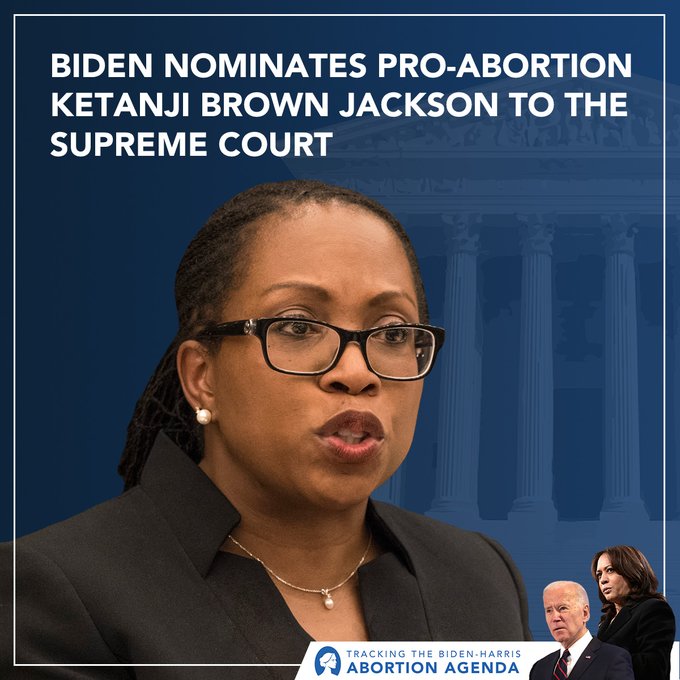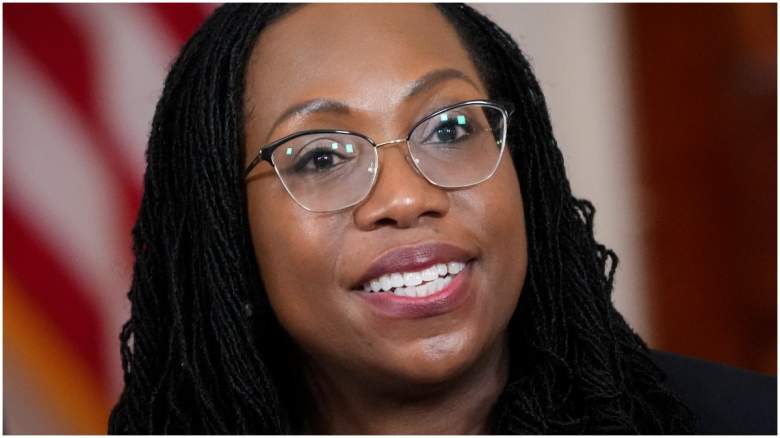
Getty Where does Ketanji Brown Jackson stand on abortion and Roe v. Wade?
Ketanji Brown Jackson is President Joe Biden’s nominee to the U.S. Supreme Court and, as such, her stance on abortion and Roe v. Wade will be closely scrutinized.
She has refused to comment on Roe v. Wade during her confirmation hearings, as well as other controversial cases decided by the court. However, a friend-of-the-court brief she once filed as a lawyer on behalf of groups supporting abortion has gained some attention.
The Supreme Court does have some abortion cases on its plate; the body hasn’t yet ruled on Dobbs v. Jackson Women’s Health Organization case, which is a case that challenges an abortion ban. According to SCOTUS blog, the central issue in that case is “whether all pre-viability prohibitions on elective abortions are unconstitutional.” The case was argued in December 2021.
Here’s what you need to know about Jackson and abortion:
1. Brown Jackson Has Refrained From Commenting Specifically on Roe v. Wade
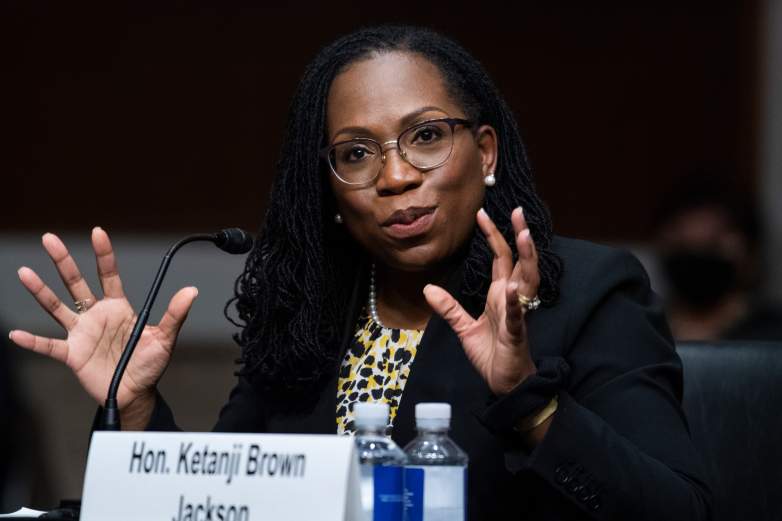
GettyKetanji Brown Jackson, nominee to be U.S. Circuit Judge for the District of Columbia Circuit, testifies during her Senate Judiciary Committee confirmation hearing in Dirksen Senate Office Building on April 28, 2021.
The question of where Brown Jackson stands on Roe v. Wade came up during her confirmation hearing to the federal bench. She was asked whether Roe v. Wade was correctly decided.
She refrained from addressing the question, saying, according to her responses to the chair of the Senate Judiciary Committee,
As a sitting federal judge, all of the Supreme Court’s pronouncements are binding on me, and under the Code of Conduct for United States Judges, I have a duty to refrain from critiquing the law that governs my decisions, because doing so creates the impression that the judge would have difficulty applying binding law to their own rulings. Consistent with the positions taken by other pending judicial nominees, it is my testimony that it would be inappropriate for me to comment on the merits or demerits of the Supreme Court’s binding precedents
She also said in her responses that Biden did not speak with her about Roe v. Wade or abortion or get a commitment from her on those matters before nominating her to the federal bench.
2. She was Listed as Counsel in a Friend-of-Court Brief Filed by Groups That Support Abortion Arguing for Buffer Zones at Protests of Abortion Providers
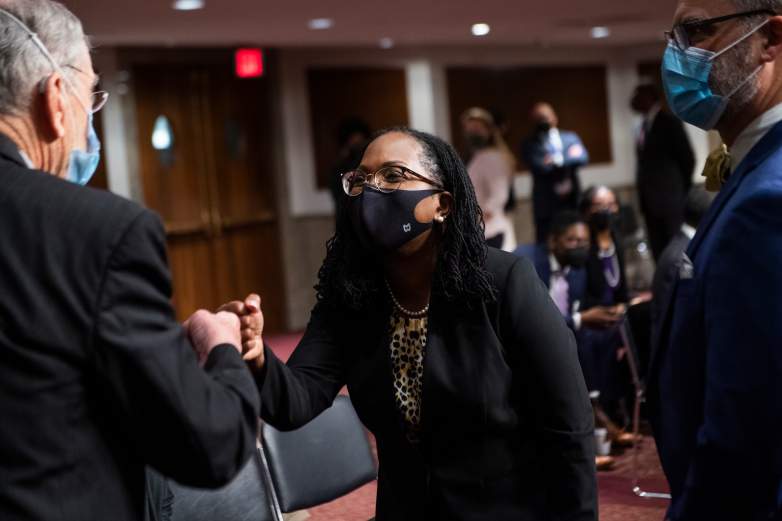
GettyKetanji Brown Jackson
At her confirmation, she was asked,
You were listed as a counsel on a brief in support of defendant-appellants in McGuire v. Reilly, 260 F. 3d. 36 (1st Cir. 2001). Some of the amici curiae your brief was on behalf of include: Repro Associates, Abortion Access Project of Massachusetts, Mass. NARAL, and the Religious Coalition for Reproductive Choice, among others.
According to SBA List, a group that opposes abortion,
In 2001, in McGuire v. Reilly, Jackson co-authored an amicus brief supporting a Massachusetts law that created a floating ‘buffer zone’ to prevent pro-life sidewalk counselors from approaching to speak with women outside of abortion facilities. Jackson’s clients included NARAL, the Women’s Bar Association of Massachusetts, the League of Women Voters, and the Abortion Access Project of Massachusetts. NARAL and the pro-abortion National Women’s Law Center strongly supported her nomination to the D.C. Circuit.
In the confirmation hearing, she was asked:
“a. You appear to have worked on this brief while an associate at a law firm in Boston. Was this a pro bono case?
b. How did you get involved with this case? Did you seek out this assignment?
c. Based on your brief’s analysis of Hill v. Colorado, could a legislature enact content-neutral buffer zones that prohibited protests to occur outside of federal courthouses or police stations?”
She responded:
The referenced brief was drafted and filed when I was an associate at Goodwin Proctor LLP in Boston in 2001, during my first year of law practice after completing my Supreme Court clerkship. I was assigned to work on this amicus brief related to a matter that was pending in the First Circuit, among other projects. I do not recall how I came to work on this assignment, but I am listed on the brief along with the Goodwin Proctor partner and senior associate with whom I was working at that time. The analysis of Hill that is presented in that brief is a legal argument that was made on behalf of my amici-clients, and there have been developments in the law concerning buffer zones in the two decades that have transpired since the brief was filed. As a sitting federal judge, I am bound by the Supreme Court’s current First Amendment caselaw, and I would apply the binding case law of the Supreme Court and the D.C. Circuit if I am assigned to any First Amendment case in which such precedents are applicable. As a pending judicial nominee and a sitting federal judge, it would be inappropriate for me to opine on the constitutionality of buffer zones that government officials might establish in hypothetical circumstances.
3. Planned Parenthood Is Supporting Jackson’s Nomination
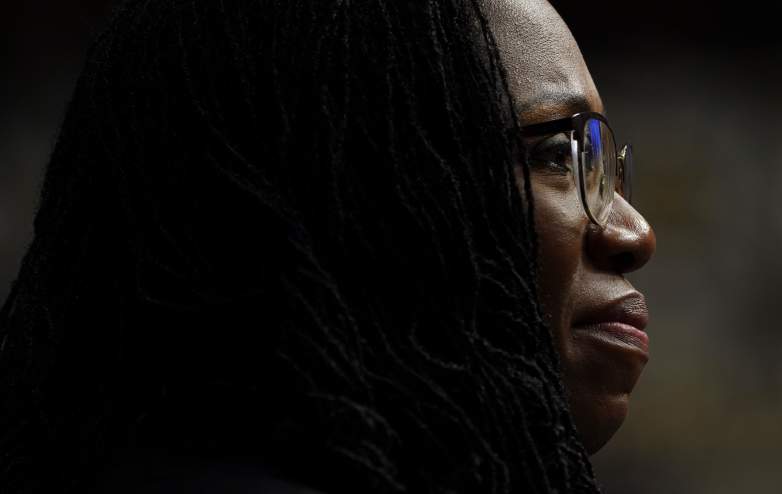
GettyKetanji Brown Jackson, nominated to be a U.S. Circuit Judge for the District of Columbia Circuit, testifies before a Senate Judiciary Committee hearing on pending judicial nominations on Capitol Hill, April 28, 2021 in Washington, DC.
Alexis McGill Johnson, president and CEO of Planned Parenthood Federation of America, which supports abortion rights, released a statement celebrating Brown Jackson’s nomination. It reads:
We celebrate the historic nomination of Judge Jackson to serve as a U.S. Supreme Court justice. Judge Jackson brings a wealth of knowledge, expertise, and meaningful experience after years of service as a federal judge on both the U.S. Circuit Court of Appeals for the D.C. Circuit and the U.S. District Court for the District of Columbia, and as a public defender earlier in her career. Beyond her record of remarkable achievement, it is clear that she has a deep commitment to public service and pursuing equal justice under the law, including safeguarding individual rights and liberties. And as the first Black woman ever named to the Supreme Court, this historic nomination is long overdue.
“This nomination arrives as our freedoms and civil liberties are in crisis. We are currently awaiting a Supreme Court decision in the Dobbs v. Jackson Women’s Health Organization case that challenges a blatantly unconstitutional ban on abortion after 15 weeks of pregnancy. The Court could rule to overturn nearly 50 years of precedent, established by Roe v. Wade, and decimate abortion access in states across the country. Already, Texans have spent nearly six months with a ban on abortion at six weeks of pregnancy, before many people even know they’re pregnant. Now more than ever, we need a Supreme Court justice who understands the impact of the court’s rulings on people — particularly on reproductive and LGBTQ+ rights — and the importance of protecting individual liberties for generations to come.
“Judge Jackson will play a crucial role in the direction the court takes in the future. As the Senate considers her nomination, we must not lose sight of how meaningful this moment is for this country, and for Black women. Far too often, we don’t see ourselves represented in the highest seats of government. This nomination is also part of essential work to rebuild our courts and protect our health and rights. We call on the Senate to swiftly consider Judge Jackson’s nomination.
4. Pro-Life Groups Oppose Her Nomination, With One Calling Her an ‘Extreme Nominee’
March for Life, a group that opposes abortion, wrote on Twitter, “We urge the Members of the Senate to stand for our nation’s mothers & most vulnerable unborn by rejecting this extreme nominee, & we encourage the nomination of a judge who will honor our Constitution & the right to life.”
SBA List, which advocates for pro-life causes, opposes Jackson’s nomination. The group wrote:
Joe Biden is fulfilling his promise to only appoint justices who support the Roe v. Wade regime of abortion on demand up to birth – a policy so extreme only a handful of countries in the world hold it, including North Korea and China. Ketanji Brown Jackson is backed by many of America’s most radical pro-abortion groups. She is on record opposing the free speech rights of pro-life advocates pleading to save lives outside abortion centers and supporting the false claim that abortion is ‘health care.’ We have no doubt she will work with the most pro-abortion administration in history to enshrine abortion on demand nationwide in the law,” said SBA List President Marjorie Dannenfelser in a statement.
“With the Court’s decision in Dobbs expected this summer, the stakes have never been higher in the fight to protect unborn children and their mothers and let the people decide this issue through their elected representatives, not unelected judges. The overwhelming majority of Americans reject the Democrats’ extreme agenda that includes late-term abortions when unborn children can feel pain, dismemberment abortions, lethal discrimination abortions, and more. In this critical election year, SBA List will work tirelessly to ensure that voters remember this when they go to the polls and that abortion extremists face political consequences.
5. Jackson Was on the Board of a Christian School That Believes in the ‘Sanctity of Life’
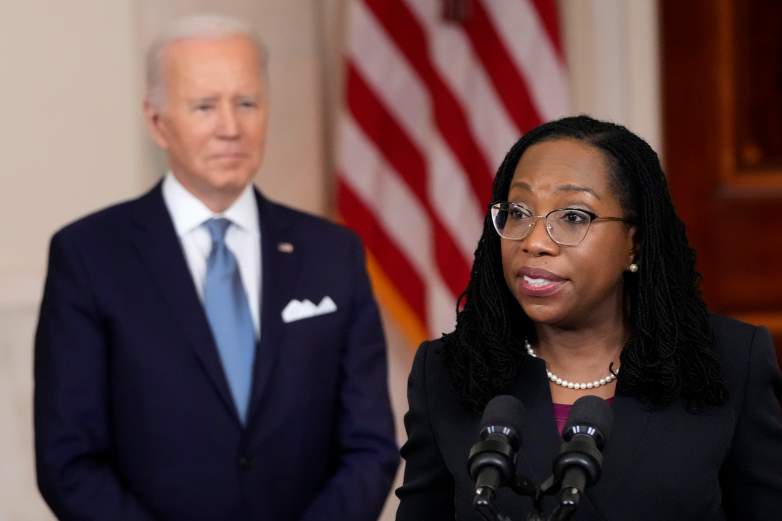
GettyKetanji Brown Jackson, circuit judge on the U.S. Court of Appeals for the District of Columbia Circuit, makes brief remarks after U.S. President Joe Biden introduced her as his nominee to the U.S. Supreme Court during an event in the Cross Hall of the White House February 25, 2022 in Washington, DC.
Jackson fills her speeches with religious reference. At her nomination speech, she referred to “thanking God for delivering me to this point in my professional journey.” She also said “one can only come this far by faith.”
According to Catholic News Agency, “details of her faith are unclear,” but “she served on the inaugural advisory board for a Christian school in Rockville, Maryland, from 2010-2011.”
The school supported the “sanctity of all human life from conception to natural death,” CSA reported.
She was asked about that school during her confirmation hearings to the federal bench. “I was aware that Montrose Christian School was affiliated with Montrose Baptist Church,” she said. “I was not aware that the school had a public website or that any statement of beliefs was posted on the school’s website at the time of my service.”
READ NEXT: Leila & Talia Jackson, Judge Ketanji Brown Jackson’s Daughters
